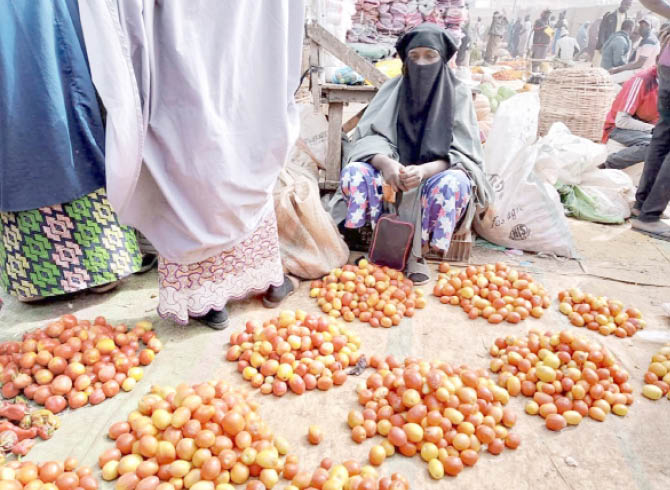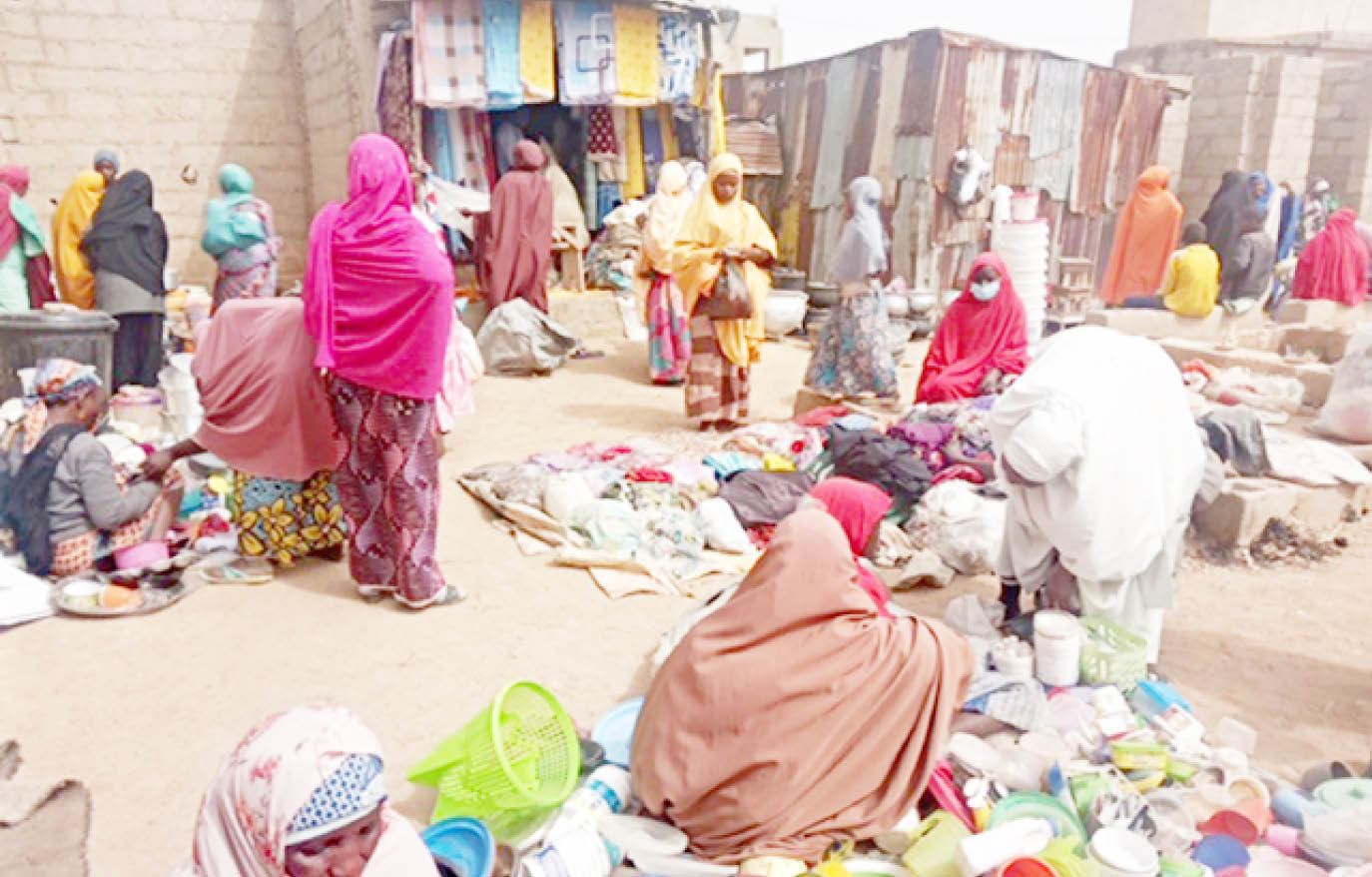For over five years, Rabi Umar has been coming to Yan Kaba market on a daily basis to sell tomatoes and other vegetables. She said it was the only trade she could rely on if she was to take care of her five children, whose father died six years ago.
For Rabi, selling tomatoes and other perishable items is paying off. She said it was her sister who advised her to launch into the business five years ago after she discovered the “women area.”
“I started investing with N2,500. I used the money to buy from the big marketers and sell it at home. After I did that three times, I decided to ask a fellow woman how I could secure a spot here, and she told me that if I could come to the market as early as 6:00am she would allow me use her name to start as she’s well known by the marketers.
“I can remember that day vividly. We asked the price of pepper, and they told us it is 9,000, so I collected it as a loan and sold it for N9,500. The next day I bought two baskets of tomatoes and sold them. So that’s how I started.
- Defection: Kogi APC wants Ajaokuta Rep’s allowances stopped
- No going back on cash withdrawal limits, NFIU tells govs
“And I can confidently tell you that with this business I am doing better financially. I take care of my children,” Rabi said with a smile.
Women’s participation in trade is growing in Nigeria, albeit continuously dominated by men, especially in the northern part of the country due to some cultural and religious beliefs. In Nigeria, due to some growth bottlenecks, women comprise only 41 per cent of micro-business owners, findings show.
Daily Trust reported how young female entrepreneurs in northern Nigeria are now breaking the glass ceiling and proving their mettle by using digital platforms to engage in e-commerce business.
According to a survey conducted by the Nigerian International Trade Centre (ITC), the current regulatory environment, social bias and economic structures are significant blockages to the advancement of women in trade participation and performance in Nigeria.
Despite all these pushing and pulling factors of women participation in trade, several markets in Kano State have started dedicating sections solely for women traders that engage in businesses hitherto dominated by men. Places like ‘Yan Kaba Market and Larabar Mata are some of these markets.
Daily Trust on Sunday spoke with some of these traders, who were able to turn their sorrows into businesses, most of them after being divorced and left with children to take care of, and other additional obstacles they faced as women in the community.

Yan Kaba is an ancient market in Kano, where groceries and a variety of food stuff, either bulk purchase or small quantity, are sold. It is situated at Nasarawa Local Government Area. It is also a market where thousands of locals and foreigners buy and sell.
Hajiya Fatima, a divorcee, is a trader at Yan Kaba, and she told Daily Trust on Sunday how hardship and responsibility drove her to the market.
“I started this business after I was divorced and left with children to take care of. Even before I got married, I used to come here and buy tomatoes and pepper to sell at home, but after the divorce I decided to find a spot here and continue my business.
“What I and the rest of us (women traders) normally do is to collect groceries from the big marketers without paying, then sell it by adding a small profit on top, then pay them back. It is actually the reason I chose this particular business as it doesn’t require much capital. Sometimes you can even owe the marketers for a long period of time, and pay at your convenient time.
“They (marketers) are very understanding and sympathetic. And it is not just the marketers, even the male buyers usually buy from us even if they initially have no such intention because we are women doing something that was men’s business”, said Fatima.
How women built a mega market in Kano community
Larabar Mata is a biweekly women market that opens on Wednesdays and Saturdays. It was gathered that the market originally started when a leprosy hospital was built in the area. It usually opens on Mondays and later moved to Wednesdays.
So, when the local women realised the crowd gathering around the hospital, they started selling food to the patients and doctors. That’s where the market gets its name ‘Larabar Mata,’ which translates as “women’s Wednesday.”
But despite being majorly a female market, the chief and head of the market is a man.
Rabiu Hasan Zara, the chief and head of Larabar Mata market, told Daily Trust on Sunday that years later, it was decided that since the market was developing, and more people were recognising it, it should be registered as an official weekly market.
“Although from the beginning, only food items like cooked cassava, moringa and peanut bars (known locally as kulikuli) are sold, now almost everything ranging from household items, to cooking oil, children’s clothing, to food stuff, among others, are sold.
“This market has impacted the economy of not just the state, but the country in general, as unlike before, more than 2,000 people, both men and women, come here weekly to buy things. You can even see for yourself how people have already started purchasing shops, not just stalls,” he said.
He said the major challenge they faced was how the government did not recognise Larabar Mata as a big market like Wambai or Kwari, thus never offering assistance to them.
“If you see the number of people earning their daily bread here you would wonder what would become of them and their family if the market collapsed. What will the government do with them? I am saying this is because there are more poor people here. This place was originally owned by Audu Bako people, they sold it to the government, who sold it to companies and the companies sell it to people.
“Now, the challenge is that those poor people don’t have enough money to buy a shop or stall because they are very ordinary traders. So, what we want the government to do is come up with a project like Yan Tebura Mall like the ones in Kantin Kwari market in the remaining unsold spots.
“The government should know that we are very organised, to the extent that we form committees and meet regularly to discuss how we can get the traders that are selling things outside the market to come back inside. I promised them that I would talk to the company to accommodate them pending the time they sell the places,” he added.
Challenges for the female traders
Hajiya Fatima said one of the major challenges they faced was uncertainty as sometimes it is profitable and sometimes not.
“It depends on the number of buyers. And like we all told you, it is not that we have huge investments. Most of the time we get transportation fare after selling the goods, if not, we borrow it from fellow marketers and pay when we have the chance,” she said.
Many other women in this market are now taking a cue, venturing into daily trading of vegetables in order to ease their suffering and meet up with their day-to- day activities and demands.
But they said there were challenges mostly associated with the current high cost of living and uncertainty.

 Join Daily Trust WhatsApp Community For Quick Access To News and Happenings Around You.
Join Daily Trust WhatsApp Community For Quick Access To News and Happenings Around You.


